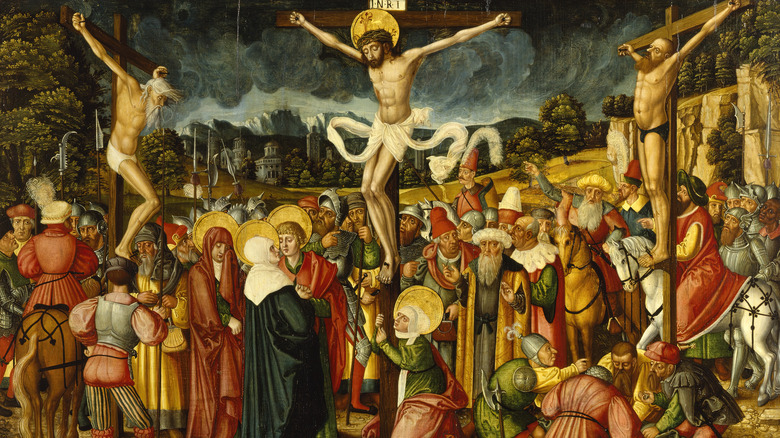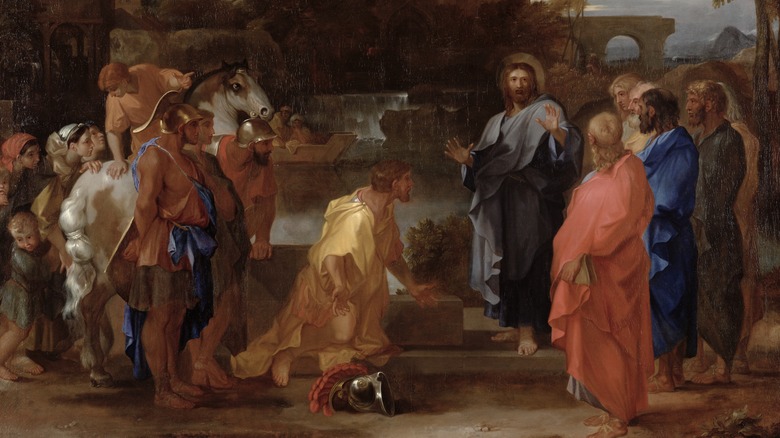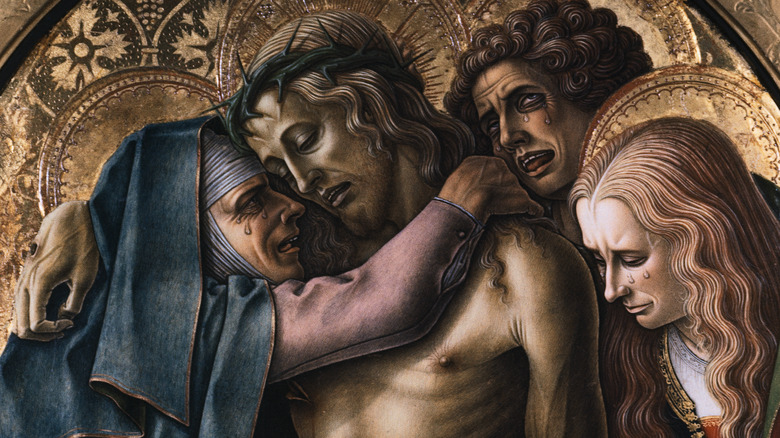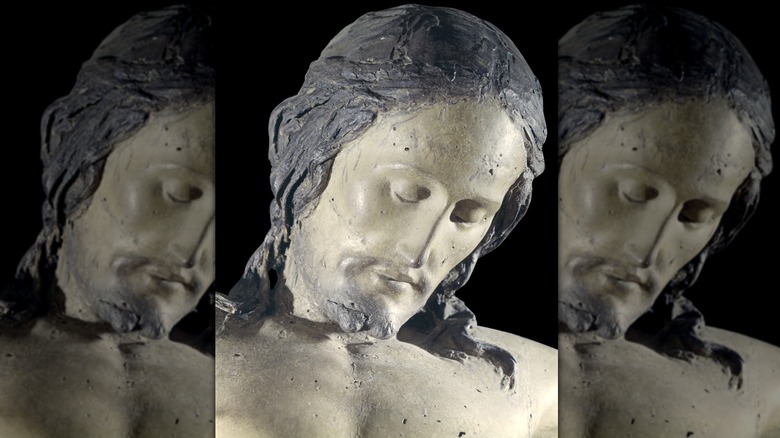The Haunting Last Words Of Jesus
Can a man truly be said to have last words if he escapes the grave? The dual nature of Jesus Christ — fully human, subject to wants, hunger, despair, and death, and yet fully divine and therefore eternal — is among the most difficult aspects of Christianity to wrap your mind around, for believers and skeptics alike. It demands accepting that Jesus was truly killed by crucifixion and descended into Hell and that he returned to Earth to speak to his disciples before ascending into Heaven.
But in Christian theology, Jesus's death on the cross is accepted as a true death, and his final words upon the cross are recorded in the Bible. They are also known as the seven sayings of Christ on the cross. Scattered among the gospels, they've been an integral part of Christian prayer and ceremony throughout the history of the religion, and they've been analyzed and interpreted as reflections of Jesus's mindset and message, each word corresponding to a different message.
Though the seven sayings are often pooled together to form a grander narrative, none of them occurs in all four gospels, and only one repeats across them. Their grouping is an example of gospel harmony, the weaving together of elements from the four books to provide a richer, unified account of the testimony of Jesus.
The Gospel of Luke has sayings of forgiveness, salvation, and reunion
In the traditional order of the seven last sayings of Christ, the first two and the last belong to the Gospel of Luke, despite Luke being the third of the canonical gospels. In Luke 23:34, when Jesus is put up upon the cross, his first words are the cry, "Father, forgive them, for they know not what they do." This is his Word of Forgiveness, an expression during an agonizing death at the hands of sadistic soldiers of the message Jesus gave in easier circumstances elsewhere: "Love your enemies and pray for those who persecute you."
Luke goes on to say that Jesus was crucified by two criminals, one to his right and one to his left. One demanded that Jesus save himself and his fellow convicts, but the other rebuked him, saying that they were justly tried and that Jesus was innocent. To him, Jesus said, "Today you will be with me in paradise." This is his Word of Salvation, an example of redemption through Christ presented by the contrasting reactions of the criminals who died with him.
The final words Jesus speaks in Luke before dying on the cross are "Father, into your hands I commit my spirit," a quotation from Psalm 31. This has traditionally been interpreted as the Word of Reunion, the declaration of Jesus's returning to God and paving the way for mankind to follow suit.
The Gospel of John has sayings of relationship, distress, and triumph
The Gospel of Luke is believed to have been written for a largely Gentile audience and is primarily concerned with presenting a full account of Jesus's life as a mortal man. The Gospel of John was more concerned with his divinity, and it devotes more time to Jesus's final days. Traditionally, the third, fifth, and sixth of the seven sayings of Christ on the cross are taken from John. The third is John 19:26, where Mary, her sister, Mary Magdalene, and "the disciple who [Jesus] loved" (popularly assumed to be John the Apostle) gather underneath Jesus's cross. Jesus looks at his mother and tells her, "Woman, here is your son." To the disciple, he says, "Here is your mother." These are taken as the Word of Relationship, a reassurance to Jesus's birth mother and providing for her after his death.
According to John, when Jesus felt the approach of death, he said, "I thirst," in order that Psalm 22:15 might be fulfilled: My mouth is dried up like a potsherd, and my tongue sticks to the roof of my mouth; you lay me in the dust of death." In response, Jesus was given a sponge full of vinegar. "I thirst" is presented as the Word of Distress.
Having fulfilled Scripture, Jesus gives up the ghost himself, with the final words: "It is finished." While this could be in reference to the torment of crucifixion, "It is finished" is more often taken as the Word of Triumph, a declaration that the mission to provide salvation for mankind was at last accomplished.
The Gospels of Matthew and Mark share a saying of abandonment
The Gospels of Matthew and Mark each hold just one of the seven sayings of Christ on the cross, and it's the same one. In both books, after Jesus is taken to Golgotha, crucified, and mocked, he cries out "My God, my God, why hast thou forsaken me?" In so doing, he quotes Psalm 22:1. More mockery follows, and Jesus dies with a last loud cry of anguish.
Traditionally counted as the fourth saying, "Why hast thou forsaken me?" is interpreted as the Word of Abandonment. Being fully human, Jesus was capable of feeling despair, loneliness, and the sense that God had deserted him. But expanded interpretations on the Word of Abandonment include a second meaning for some; Jesus "abandons," or relinquishes, the bonds that tie humanity to the stain of sin.
Matthew and Mark are believed to have been written for different audiences; Matthew was aimed primarily at Jewish readers, Mark at Romans and Gentiles. But their accounts of Jesus's final moments on the cross are nearly identical. A key difference is that, in Matthew, Jesus's lamentation and death cry are followed by the splitting of rocks, the opening of tombs, and the appearance of holy men's ghosts to people in Jerusalem.



